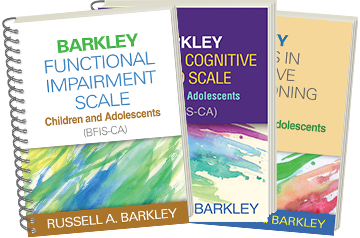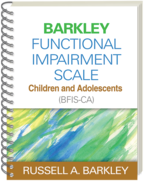Barkley Functional Impairment Scale—Children and Adolescents (BFIS-CA)
Russell A. Barkley

QUICK VIEW
What does it do?: Assesses psychosocial impairments in 15 domains of major life activities.
Age Range: 6-17
Administration Time: 5-7 minutes.
Format: Parent-report rating scale.
Cost of Additional Forms: No cost—purchasers get permission to reproduce the forms and score sheets for repeated use.
See also the Barkley Deficits in Executive Functioning Scale—Children and Adolescents (BDEFS-CA) and the Barkley Sluggish Cognitive Tempo Scale—Children and Adolescents (BSCTS-CA).?
Includes Permission to Photocopy
Enhancing the convenience and value of the BFIS-CA, the limited photocopy license allows purchasers to reproduce the forms and score sheets and yields considerable cost savings over other available scales. The large format and sturdy wire binding facilitate photocopying.
Age Range: 6-17
“As the goal of pediatric behavioral health intervention expands from simple symptom reduction to also include improvement in daily functioning, it is important to have reliable, valid, and empirical measures of functional impairment that are convenient for clinical administration and that assess multiple domains of a child’s daily life. The BFIS-CA is just such a measure. Applicable to both clinical or research situations, the BFIS-CA is also an important resource for social work, psychology, pediatric, and psychiatry trainees learning how to measure functional impairment in referred children and adolescents.”
—Daniel F. Connor, MD, Lockean Distinguished Professor in Mental Health Education, Research, and Clinical Improvement, and Chief, Division of Child and Adolescent Psychiatry, University of Connecticut School of Medicine
“Because there have been so few data available on impairment in most childhood disorders, this work bridges a major gap in the literature. It is a meticulous and carefully crafted scale and manual that will be of enormous use for all practitioners responsible for assessing childhood and adolescent disorders, including ADHD. The psychometric data are especially compelling; information on reliability and validity will provide diagnosticians a great deal of comfort in ensuring that the instrument is psychometrically sound.”
—Ronald T. Brown, PhD, ABPP, Senior Vice-President of Academic Affairs and Provost, Wayne State University
“There has long been a need for an empirically based measure of functional impairment that has proven reliability and validity and is based on a large normative sample. The BFIS-CA, developed out of Barkley’s work in the area of mental disorders for over 30 years, finally fills that need. The BFIS-CA is accessible and easy to use. This is an outstanding contribution to the field—and more specifically, to children who are struggling and their service providers.”
—Karen R. Harris, EdD, Regents Professor Emeritus and Research Professor, Division of Educational Leadership and Innovation, Arizona State University
“Assessing impairment is a critical task for clinicians working with children and adolescents. The BFIS-CA is a terrific addition to existing measures for evaluating impaired functioning. Clear advantages of this rating scale include the provision of national norms and usefulness across child and adolescent samples. Impairment spans clinical diagnoses; the BFIS-CA also includes normative information for specific child/adolescent disorders, which is a real plus. The BFIS-CA is easy to administer, score, and interpret, which should allow it to be efficiently integrated into existing assessment batteries.”
—Gregory A. Fabiano, PhD, Department of Counseling, School, and Educational Psychology, University at Buffalo, State University of New York
“The BFIS-CA represents a significant and practical advancement in the psychosocial assessment of children and adolescents. Previously available measures have been limited by the absence of normative information and narrower coverage of psychological domains. The BFIS-CA is a psychometrically sound measure that assesses 15 domains of life activities and yields distinct scoring profiles for males and females aged 6-11 or 12-17. The follow-up interview form provides in-depth information on domains rated as impaired. Practitioners and researchers alike will appreciate the savings in time and money associated with the unique photocopy license.”
—J. Ron Nelson, PhD, Department of Special Education and Communication Disorders, University of Nebraska-Lincoln
The BFIS-CA has benefited from more than 30 years of research with its predecessor scale, the Home Situations Questionnaire (Barkley, 1981), and the subsequent development of the BFIS-CA from it. It has also benefited from the development of a comparable rating scale for assessing impairment in adults: the Barkley Functional Impairment Scale (BFIS).
Scores are obtained for 15 specific domains of major life activities, including relationships with parents, siblings, children in the neighborhood, and children at school; community activities; interactions with adults other than parents; school performance; self-care; money management; sports participation; and following rules, among other domains. Two broadband summary scores are computed for the Home–School mean impairment score (consisting of 9 domains) and the Community–Leisure mean impairment score (consisting of 6 domains). A total number of impaired domains score is also computed. These constitute the 18 primary scores. Eight additional questions provide further information on specific types of impairment related to friendships, community participation, sports, and educational performance and adjustment.
The large normative sample (N = 1,800) is representative of the U.S. population in terms of region, ethnicity/race, gender, and employment status, based on the 2000 U.S. Census. Unlike other comparable rating scales, the normative sample was not filtered to exclude children receiving special education or psychiatric medications.
Reliability
Reliability of the scores is quite satisfactory as evidenced by high internal consistency (Cronbach’s alpha of .97 for entire scale, and .95 and .96 for the Home–School and Community–Leisure mean impairment scores, respectively) and by high test–retest reliability over a 3–5 week interval (.86 for the Home–School mean impairment score; .83 for the Community–Leisure mean impairment score; .87 for the number of impaired domains score).
Validity
Validity of the scale scores is substantiated through high correlations with other rating scales of executive functioning and ADHD symptoms. Factor analysis also demonstrated a single broadband factor of impairment that comprises two narrower-band but interrelated dimensions of Home–School (work related) and Community–Leisure domains. Children and teens scoring high on the scale demonstrated impairment in separate measures of social unpopularity, community involvement, sports participation, teacher reports of behavioral or school performance problems, previous grade point average, and history of grade retention, suspension, or expulsion. Significant differences in BFIS-CA scores were demonstrated among children with and without various psychiatric, developmental, learning, and neurological diagnoses, as well as among children and teens receiving (or not receiving) various types of psychiatric, psychological, and educational treatment services.
More extensive technical information is provided in the manual.
Table of Contents
Introduction1. Defining Psychosocial Impairment
2. Development of the BFIS-CA
3. Factor Analysis, Scale Construction, and Item Frequencies
4. Relationship of BFIS-CA Scores to Demographic Factors in the Normative Sample
5. Reliability
6. Validity
7. Relationship of BFIS-CA Scores to Disorders
8. Relationship of BFIS-CA Scores to Treatments
9. Scoring and Interpretation of the BFIS-CA Forms
Appendix: BFIS-CA Forms, Score Sheet, and Impairment Profiles
BFIS-CA Parent Rating Scale
BFIS-CA Parent Interview
BFIS-CA Score Sheet
BFIS-CA Impairment Profile (Ages 6–11, Males Only)
BFIS-CA Impairment Profile (Ages 12–17, Males Only)
BFIS-CA Impairment Profile (Ages 6–11, Females Only)
BFIS-CA Impairment Profile (Ages 12–17, Females Only)
About the Author
Russell A. Barkley, PhD, ABPP, ABCN, before retiring in 2021, served on the faculties of the University of Massachusetts Medical Center, the Medical University of South Carolina, and Virginia Commonwealth University. Dr. Barkley has worked with children, adolescents, and families since the 1970s and is the author of numerous bestselling books for both professionals and the public, including Taking Charge of ADHD and Your Defiant Child. He has also published six assessment scales and more than 300 scientific articles and book chapters on attention-deficit/hyperactivity disorder, executive functioning, and childhood defiance. A frequent conference presenter and speaker who is widely cited in the national media, Dr. Barkley is past president of the Section on Clinical Child Psychology (the former Division 12) of the American Psychological Association (APA), and of the International Society for Research in Child and Adolescent Psychopathology. He is a recipient of awards from the American Academy of Pediatrics and the APA, among other honors. His website is www.russellbarkley.org.- Author's website
- All titles by Russell A. Barkley
- Sign up for emails on upcoming titles by Russell A. Barkley (with special discounts)!
Audience
Child clinical, forensic, and school psychologists; neuropsychologists; social workers; psychiatrists; psychopathology researchers.
 Special package offer:
The
Special package offer:
The
Order all 3 items for $477.95, instead of $636.00 if bought separately!
order package
